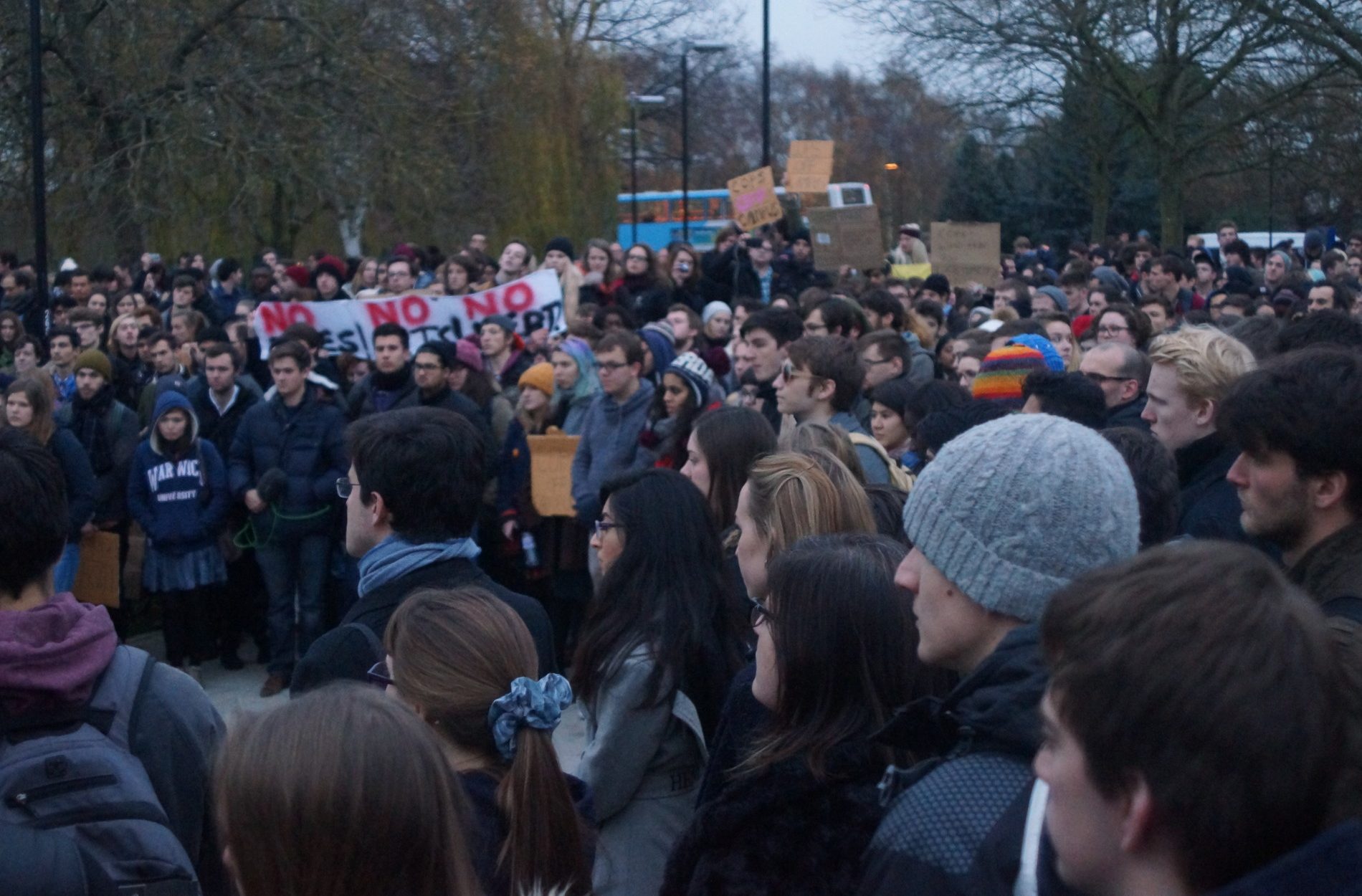Everything is holy! everybody’s holy! everywhere is holy! everyday is in eternity! Everyman’s an angel![i]
On December 4, 2014, Warwick campus was the site of the largest rally in its history, one that gathered nearly 1000 demonstrators to protest against the violent response to a peaceful student sit-in against fees held the day before. I attended the rally to stand alongside students and colleagues all saddened by the previous day’s events.
Some of the organizers were from my home department, and had staged various Occupy events on campus before at which I’d read poetry by William Blake. This time I offered to read part of a modern poem by one of Blake’s heirs: Allen Ginsberg’s ‘Howl’ (1955).
The poem is not short (125 lines, each to be read, claimed Ginsberg, in a single breath). During my reading, a Guardian journalist present at the rally tweeted about the incongruity between its length and the icy temperatures of a late afternoon on campus in December. Another commentator remarked that a “lecturer reading out Ginsberg’s ‘Howl’ at a peaceful protest is the most Warwick thing I have ever heard”. But many onlookers appeared buoyed by the poem’s direct and deliberately sensational language that had intruded into a series of eloquent political speeches.
In tune with the rally’s objective, ‘Howl’ has been an anthem of protest, since its first performance at the Six Gallery in San Francisco in 1955. It has also been subject to various efforts of censorship and suppression. The text was tried for obscenity in 1957 by the San Francisco police and petitioned against in 1969 by eighty-two members of the Finnish Parliament who accused Ginsberg of indecency. In 1987, the Federal Communications Commission ruled that television and radio broadcasters risked penalty if they aired readings of the poem, and censorship laws continue to threaten the poem even today. Here’s what Ginsberg said about the matter in 1990:
Censorship of my poetry and the work of my peers is a direct violation of our freedom of expression. I am a citizen. I pay my taxes and I want the opinions, the political and social ideas and emotions of my art to be free from government censorship. I petition for my right to exercise liberty of speech guaranteed me by the Constitution. I reject the insolence of self-righteous moralistic fundraising politicians or politically ambitious priests in using my poetry as a political football for their quasi-religious agenda. I have my agenda for emotional and intellectual and political liberty in the U. S. A. and behind the Iron Curtain. This is expressed in my poetry.[ii]
Ginsberg replaces the vain and self-serving ‘quasi-religious’ agenda of politicians and priests with a poetic agenda shaped by a collage of spiritual languages from several traditions. As a gay, Jewish poet drawn to Buddhism and Hinduism, Ginsberg brings together Dharmic and Abrahamic faiths while retaining their distinctions to forge his own definition of ‘holiness’. For him, holiness is kindness culminating in a quiet attention to others and the world.
‘Howl’ has been an anthem of protest, since its first performance
Having read several lines from ‘Part I’ (and sensing restlessness in the crowd), I decided to skip to my favourite part of the poem: the concluding ‘Footnote’ (included in full below). As a supplementary to the main text, the ‘Footnote’ is a poetic list of citations that posits the word ‘holy’ as the poem’s primary source. ‘Holy! Holy! Holy! Holy! Holy! Holy! Holy! Holy! Holy! Holy! Holy! Holy! Holy! Holy! Holy! / The world is holy! The soul is holy! The skin is holy! The nose is holy! The tongue and cock and hand and asshole holy!’ read the first two lines. Forgiveness, redemption, faith, mercy, magnanimity: all of these add up to a holiness Ginsberg calls a ‘supernatural extra brilliant intelligent kindness of the soul!’ Here is a statement of intensity and luminosity connected to perception and acuity and grounded in a compassion implicit to our being. It is a soul-knowledge or intuition, a subjective domain within us that privileges conscience and the heart without fear of reproach or caricature.
Not everyone enjoyed the reading. There was anger at my reading aloud of the poem’s opening lines, in which Ginsberg describes seeing ‘the best minds’ of his generation, ‘destroyed by madness, starving hysterical naked / dragging themselves through the negro streets at dawn looking for an angry fix’. For some, hearing a white woman voice the phrase ‘negro streets’ was unacceptable, especially given the context of a rally seeking to expose the actions of those with power against those with none.
Amidst the genuine fear many members of the university felt, ‘Howl’ at once articulated a celebratory blast of dissent and a manifesto for quietude and meditation
I apologise to anyone who was offended by the phrase. Ginsberg consistently uses phrases and words that aim to shock his readers, not least because he considered the repressive and violent McCarthyite world into which the poem was born in urgent need of reawakening into peace and joy. Jack Kerouac understood the ‘beat’ of the ‘Beat poets’ with whom he and Ginsberg are associated as the bliss of the ‘beatific’, a salvation through a holy joy in which communism, sodomy, jazz, and the psychiatric ward are rejoiced over alongside the typewriter, railroads, beggars and angels. ‘Holy the groaning saxophone! Holy the bop apocalypse! Holy the jazzbands marijuana hipsters peace peyote pipes & drums!’
Amidst the genuine fear many members of the university felt on December 4 – especially of the suppression of intellectual freedom and the right to voice ‘emotional and intellectual and political liberty’ – ‘Howl’ at once articulated a celebratory blast of dissent and a manifesto for quietude and meditation. Ginsberg famously learned the practice of meditation from the Tibetan Buddhist abbot, Chögyam Trungpa, and passed on some of this experience in his song, ‘Do the Meditation Rock’.[iii]
In a world wherein those with power so often seek to retain it by dehumanizing others through critical as well as physical barbarity, ‘Howl’ is a reminder to all those students, academics, philosophers, artists, journalists and poets of the value of thinking over consumption. It is also a stay to a current management style popular in modern organizations that encourages its members to speak and feel in increasingly deadened modes, learning to work ‘at arm’s length, hygienically, through a polished, highly wrought intermediary instrument’, which over time, suspends personal ‘feelings, ethics’ and ‘values’.[iv]
‘Howl’ is a reminder of the value of thinking over consumption
Certain attempts to resolve the furore of December 2014 might be described as affectively ‘hygienic’, erasing the very real implications of the events for those involved under the banner of corporate placation. The reading and study of poetry, however, cannot help but be one of thinking, reflection, critique and, as Ginsberg hopes, kindness. It is thus simply incompatible with the neoliberal impulse to tidy life up under the auspices of ‘brand’. In the absence of kindness towards those protesting on December 3, but also within some of the consequent discussions of the university since then, ‘Howl’ remains for me a loving, messy and deliberately provocative proclamation of holiness, contemplation and compassion.
Banner photo by Ann Yip for the Boar
[i] Allen Ginsberg, ‘Howl’ (1955), from Collected Poems, 1947-1997 (London: Penguin, 2009); here‘s a reliable copy of the text.
[ii] Bill Morgan and Nancy J. Peters, Howl on Trial: The Battle for Free Expression (San Francisco: City Lights Books, 2006), p. 224.
[iii] Allen Ginsberg, Holy Soul Jelly Roll: Poems And Songs 1949-1993 (Rhino Records, 1994); available here.
[iv] Ann Rippin, ‘The Human Touch versus “Silver-Handedness”: the Importance of the Haptic in Organisational Life’, International Journal of Work, Organisation and Emotion, 5. 4 (2013), 357–368.



